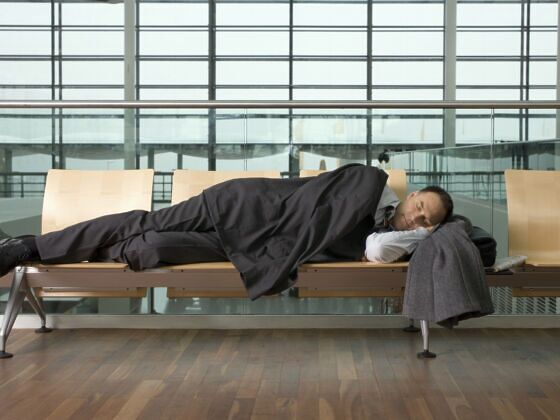We’ve all been there: You land in your destination at 4 PM, but thanks to jet lag your body thinks it’s 1 AM, and you’ve been up since 7 AM, and now you’re wondering whether you should wait until 11 PM to sleep, like you normally would, or take a quick nap — or would that throw off your circadian rhythm? What even is a circadian rhythm? Unfortunately, jet lag often isn’t just a pesky side effect of long distance travel. It can negatively impact our entire trip if not managed accordingly. Google “how to get over jet lag” and you’ll find all kinds of anecdotal rules, many of them conflicting, about how to bring your body back into alignment. But these tips aren’t personalized, might not work for everyone, and may not even have any actual scientific backing.


IHG's Luxury Hotels Partnered With Timeshifter to Help Guests Avoid Jet Lag
If only hotels had a magic button you could push upon arrival, which would automatically regulate your body and dispel jet lag. Well, no such button exists, but InterContinental Hotels & Resorts is doing the next best thing by partnering with Timeshifter, a jet lag app.
The app uses actual science to help travelers overcome jet lag through personalized steps that regulate their circadian rhythms. Inspired by the latest research, the popular app is now catering specifically to InterContinental guests, helping them minimize the effects of jet lag through personalized plans.
What causes jet lag in the first place?
The phenomenon of jet lag is strongly rooted in our body’s circadian clock. According to the National Institutes of Health, the circadian clock is a “24-hour internal clock in our brain that regulates cycles of alertness and sleepiness by responding to light changes in our environment.” Jet lag happens when you cross time zones quickly, and your circadian clock can’t keep up with real-world time, throwing the biological systems in your body all out of whack.
Basically, it’s a mismatch between your normal daily rhythms and the new time zone, resulting in a variety of symptoms, most notably daytime drowsiness and the inability to fall or stay asleep at night. It can also cause loss of appetite, headaches, problems concentrating, and irritability. Jet lag typically lasts anywhere from a few days to a few weeks, with the general rule that symptoms persist at least one day for every time zone crossed. That can be pretty debilitating if you’re traveling to the other side of the world.
“Since our circadian clock regulates nearly all biological systems in our bodies, jet lag is disrupting our entire biology — from our sleep-wake cycle, mood and performance patterns to our metabolic, immune, and reproductive systems,” Mickey Beyer-Clausen, CEO of Timeshifter, tells Matador Network. “When traveling across time zones, circadian control is therefore critical.”
So how do we regain control of our circadian clocks?
Can an app solve jet lag?
Timeshifter claims to solve jet lag with science. According to Timeshifter, the only way to reduce jet lag is by shifting your circadian clock, which means managing your light exposure and your use of melatonin before and during travel. Too much or too little light exposure at the wrong times, however, and you’ll likely make your jet lag even worse.
“It’s about the timing of light exposure and light avoidance correctly,” says Beyer-Clausen, “which must be highly personalized based on chronotype, sleep pattern, etc., since the key time cue for our circadian clock in the brain is light.”
Timeshifter not only helps you plan your light exposure and avoidance before and during travel, but it also creates a personalized plan for when to take melatonin (a sleep aid) in conjunction with this light exposure or avoidance. Taking melatonin at the right time, and at the right dose, can help you shift faster and sleep better as you transition between time zones.
“The challenge is to find the right timing for when to see and avoid light, take melatonin, sleep or nap, and use caffeine effectively,” Timeshifter’s website says. “Solving this challenge is deceptively complicated, not intuitive, and can only be determined based on your sleep pattern, chronotype, itinerary, and personal preferences. With the Timeshifter jet lag app, you can create personalized jet lag plans with all of this in mind.”
Hotels are trying to beat jet lag
InterContinental Hotels is hoping to play a key role in the vanquishing of jet lag by partnering with Timeshifter. Right now, that means using in-room videos and pamphlets to educate guests about the science behind tackling jet lag and, most significantly, the chance to use Timeshifter once at no cost on any trip (it’s usually $9.99 per trip or $24.99 per year). Over time, this partnership will likely expand to include even more guest benefits.
“Timeshifter represents one example of how we are transforming the InterContinental guest experience for today’s modern traveler,” Tom Rowntree, Vice President of Luxury & Lifestyle Brands at IHG Hotels and Resorts, said in a press release. “Our guests will have access to the technology pre-arrival and upon departure to enable them to seamlessly shift between destinations.”
If there’s one universal truth all travelers can agree on, it’s this: jet lag sucks. If we could choose between a hotel room upgrade with a free minibar and the guarantee of sidestepping debilitating jet lag, many of us would forgo the minibar.
Indeed, “the modern luxury traveler is taking health, sleep, wellness, and performance very seriously,” Beyer-Clausen says, “and expects scientifically validated tools to achieve it.”